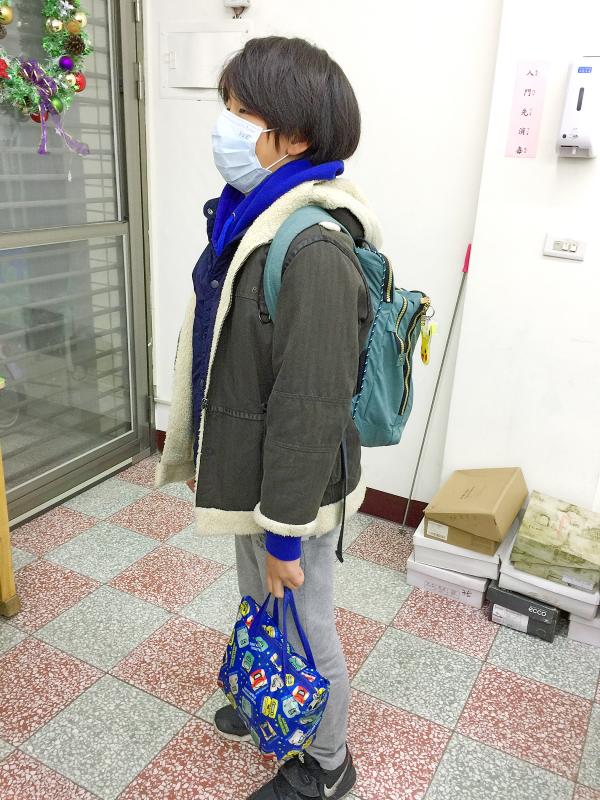More than 80 percent of schools breach Ministry of Education regulations and do not allow students to wear winter clothing, a group of youth organizations said on Thursday, calling on the ministry to enforce its rules.
A survey of 1,438 students at 853 schools found that 84.3 percent of schools are ignoring ministry regulations that allow students to wear winter clothing inside or outside their uniform during cold weather, the Taiwan Youth Association for Democracy said.
The regulations also state that the definition of “cold weather” should be determined by the student rather than the school, the association said.

Photo: Su Meng-chuan, Taipei Times
However, students reported being punished or issued a warning if they wore a hat, gloves, jacket or scarf without obtaining permission in advance, it said.
About 54 percent of schools still maintain an outright ban on students wearing warm clothing on top of their uniform, while others stipulate a certain temperature under which students can wear winter clothing, it added.
Some schools restrict certain types of clothing without advance permission, such as scarves, hats or sweatshirts, and even particular colors, the association said.
Punishments ranged from a warning to doing push-ups, cleaning or running errands, the survey showed.
Association deputy director Ho Wei-tzu (何蔚慈) said that the survey responses show that the practice has continued for a long time and students feel powerless to stop it.
Student associations that have attempted to impose the ministry’s regulations through proper channels have been pressured or threatened by administrators, Ho said.
It is ironic that so many schools require their students to follow their rules, but are not themselves following the ministry’s rules, he said.
The ministry’s K-12 Education Administration should investigate whether schools are following the regulations and not leave it up to students to fight for their rights, he added.
The K-12 Education Administration yesterday said that it had reissued documents to local education departments demanding that they remind schools to comply with the ministry’s regulations.

The Coast Guard Administration (CGA) yesterday said it had deployed patrol vessels to expel a China Coast Guard ship and a Chinese fishing boat near Pratas Island (Dongsha Island, 東沙群島) in the South China Sea. The China Coast Guard vessel was 28 nautical miles (52km) northeast of Pratas at 6:15am on Thursday, approaching the island’s restricted waters, which extend 24 nautical miles from its shoreline, the CGA’s Dongsha-Nansha Branch said in a statement. The Tainan, a 2,000-tonne cutter, was deployed by the CGA to shadow the Chinese ship, which left the area at 2:39pm on Friday, the statement said. At 6:31pm on Friday,

The Chinese People’s Liberation Army Navy’s (PLAN) third aircraft carrier, the Fujian, would pose a steep challenge to Taiwan’s ability to defend itself against a full-scale invasion, a defense expert said yesterday. Institute of National Defense and Security Research analyst Chieh Chung (揭仲) made the comment hours after the PLAN confirmed the carrier recently passed through the Taiwan Strait to conduct “scientific research tests and training missions” in the South China Sea. China has two carriers in operation — the Liaoning and the Shandong — with the Fujian undergoing sea trials. Although the PLAN needs time to train the Fujian’s air wing and

STRIKE: Some travel agencies in Taiwan said that they were aware of the situation in South Korea, and that group tours to the country were proceeding as planned A planned strike by airport personnel in South Korea has not affected group tours to the country from Taiwan, travel agencies said yesterday. They added that they were closely monitoring the situation. Personnel at 15 airports, including Seoul’s Incheon and Gimpo airports, are to go on strike. They announced at a news conference on Tuesday that the strike would begin on Friday next week and continue until the Mid-Autumn Festival next month. Some travel agencies in Taiwan, including Cola Tour, Lion Travel, SET Tour and ezTravel, said that they were aware of the situation in South Korea, and that group

Taiwanese celebrities Hank Chen (陳漢典) and Lulu Huang (黃路梓茵) announced yesterday that they are planning to marry. Huang announced and posted photos of their engagement to her social media pages yesterday morning, joking that the pair were not just doing marketing for a new show, but “really getting married.” “We’ve decided to spend all of our future happy and hilarious moments together,” she wrote. The announcement, which was later confirmed by the talent agency they share, appeared to come as a surprise even to those around them, with veteran TV host Jacky Wu (吳宗憲) saying he was “totally taken aback” by the news. Huang,